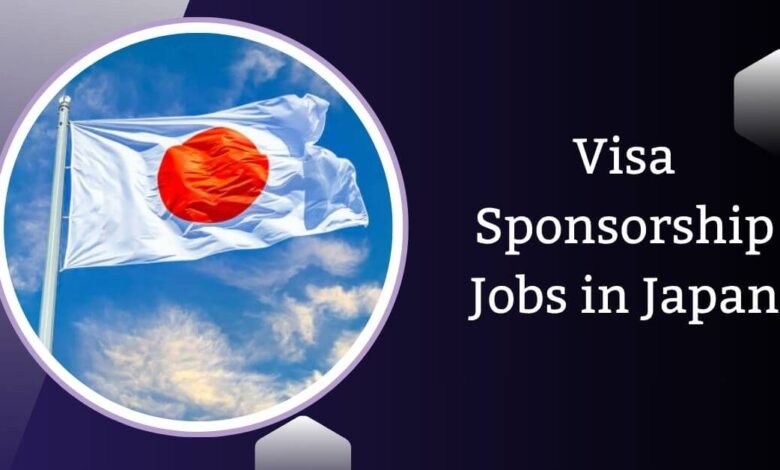Visa Sponsorship Jobs in Japan 2026 – Apply Now

Dreaming of building a career in Japan? Visa Sponsorship Jobs in Japan offer a salary of 130000 to 2300000 Yen per month in 2026 with physical work opportunities across diverse sectors like IT, engineering, language teaching, healthcare, and hospitality.
These roles are ideal for those with relevant experience and a passion for growth, providing a chance to immerse yourself in Japanese culture, gain professional skills, and create a stable and fulfilling life in one of the world’s most dynamic countries.
Visa Types for Employment:
Japan has many types of visas for foreign workers, and each one has its own set of requirements for who can get it. People who are looking for work should get a “Working Visa.” This visa comes in different types, such as Engineer, Specialist in Humanities/International Services, and Skilled Labor. There are different types of visas needed depending on the job.
Understanding Visa Sponsorship:
For people from other countries who want to work in Japan, they must first get a work visa. The most common types of work visas are the Engineer/Specialist in Humanities/International Services visa and the Instructor visa for English teachers. As a result, people looking for work must have a job offer before they go to Japan because the company paying the salary usually pays for the visa.
Benefits of Visa Sponsorship Jobs in Japan:
- Job Security: Visa sponsorship frequently includes a contract or permanent position, which ensures job security and stability for the duration of the visa.
- Legal Employment Status: The possession of a visa sponsored by an employer guarantees that you are permitted to work legally in Japan, thereby preventing any legal complications associated with unauthorized employment.
- Comprehensive Health Insurance: The majority of Japanese employers offer health insurance coverage, which guarantees that you and your family have access to high-quality medical care.
- Pension Benefits: Sponsored employees are typically enrolled in the Japanese pension system, which can offer long-term financial benefits.
- Competitive Salaries: The high demand for skilled foreign workers in a variety of industries frequently results in competitive salaries for visa sponsorship positions.
- Cultural Experience: The opportunity to fully immerse oneself in Japanese culture, acquire the language, and experience the country’s rich history and traditions is provided by living and working in Japan.
- Professional Development: A significant number of Japanese organizations allocate resources to their employees’ professional development and training, which offers opportunities to improve one’s abilities and progress in their career.
- Career Advancement: Employment in Japan can improve your professional reputation and resume, thereby providing access to future career opportunities both domestically and internationally.
- A Multicultural Work Environment: A growing number of Japanese companies are fostering a diverse work environment that encourages innovative thinking and the exchange of diverse perspectives.
- High Quality of Life: Japan is renowned for its exceptional quality of life, which encompasses a wide range of recreational and cultural activities, safety, sanitation, and public transportation.
- Professional Networking Opportunities: Employment in Japan provides an opportunity to establish a professional network in one of the world’s most advanced economies, which may prove advantageous for future career advancements.
- Language Skills: The opportunity to acquire or enhance one’s Japanese language skills is a valuable asset in both personal and professional life, and working in Japan offers a great opportunity to do so.
- Family Benefits: Numerous employers provide benefits that facilitate family life, such as education assistance for children, relocation assistance, and family health insurance coverage.
- Tax Benefits: Japan provides a variety of tax benefits and deductions for foreign laborers, which can lead to a more favorable tax treatment than in other countries.
- Work-Life Balance: While employers in Japan vary in their approach to this issue, there is a growing emphasis on enhancing work-life balance by providing paid leave, flexible working hours, and reduced overtime policies.
- Relocation Assistance: Employers frequently offer relocation assistance, which encompasses assistance with the visa process, accommodation search, and acclimatization to Japanese life.
- Global Perspective: Acquiring work experience in Japan can offer a global perspective and comprehension of international business practices that can be advantageous in any profession.
- Educational Opportunities: Japan offers a plethora of professional courses and educational institutions that you can utilize to enhance your skills and knowledge.
- Public Services: You will have access to Japan’s efficient public services, such as transportation, postal services, and public safety, as a legal resident.
- Retirement and End-of-Service Benefits: Numerous positions offer retirement benefits and end-of-service incentives, which will ensure financial stability following the termination of your employment.
- Stable Economy: Japan’s economy is both robust and stable, offering a secure environment for employment. There are numerous opportunities in a variety of sectors, including technology, engineering, education, and healthcare.
- Access to Advanced Technology: Working in Japan frequently entails the opportunity to engage with cutting-edge technology and innovation, particularly in sectors such as automotive, electronics, and robotics.
Check Also: Singapore Work Visa Process
Job Sectors and Opportunities:
- Information Technology (IT): The technology sector in Japan is experiencing significant growth, necessitating the employment of highly skilled IT professionals. Engineers, programmers, and developers are frequently in high demand. Fluency in critical programming languages and certifications can facilitate employment opportunities.
- Engineering: Japan is receptive to the recruitment of foreign experts due to its appreciation for innovative technologies and concepts. Opportunities exist in the automobile, manufacturing, and infrastructure sectors. Particularly in customer-facing positions, proficiency in the Japanese language is frequently advantageous.
- Language Teaching: English instructors are in high demand throughout Japan. The Japan Exchange and Teaching (JET) Program is a program that facilitates the exchange of language between individuals from diverse cultural backgrounds. Fluency in English is essential, and proficiency in Japanese is an additional advantage.
- Healthcare: The country permits the employment of foreign healthcare professionals, including physicians, nurses, and professors. Nevertheless, it is crucial to be able to speak and comprehend Japanese and adhere to Japanese medical standards.
Hospitality and Tourism:
The demand for individuals employed in hospitality, tourism management, and related disciplines is on the rise as the tourism industry expands. It can be extremely beneficial to possess a strong understanding of Japanese practices and to excel in customer service.
- Automobile Industry: Japan is home to numerous prominent manufacturers that significantly influence the global automobile industry.
- Finance and Banking: Tokyo is a city and a significant financial center. It is home to numerous financial institutions, banks, and the Tokyo Stock Exchange.
- Service Industry: A variety of service-oriented positions are available, including retail, customer service, and professional services.
- Agriculture and Food Processing: Despite their challenges, agriculture and food processing remain crucial to Japan’s economy.
- Construction and Infrastructure: The construction industry is a significant employer due to the ongoing need for infrastructure improvement.
Education and Skills for Visa Sponsorship Jobs in Japan:
- Language Proficiency: Japanese language abilities are essential for numerous occupations, particularly those related to business.
- Educational requirements: Certain professional certifications or educational requirements may be necessary for certain positions, depending on the field.
- Work Experience: In certain instances, it may be necessary to have worked in both the United States and another country.
- Technical Skills: Companies seek individuals who possess specific technical skills in technology and engineering positions.
- Cultural Sensitivity: To effectively integrate into the Japanese workforce, it is essential to demonstrate a deep understanding of and sensitivity to other cultures.
- Legal Compliance: Foreign laborers must comprehend and adhere to Japan’s labor laws and regulations.
- Networking Skills: The ability to establish business relationships is a critical factor in the evaluation of candidates, and their ability to network and interact with others is frequently assessed.
- Flexibility: Employers are interested in hiring individuals who are adaptable and capable of adapting to new circumstances, as the workplace may require modifications to professional norms and culture.
How To Apply For Visa Sponsorship Jobs in Japan?
- Utilize job search websites such as Jobs in Japan, Daijob, or GaijinPot, which are specifically designed to assist foreign job applicants in Japan. You may restrict your search to positions that will facilitate your visa application.
- Compose a cover letter and resume that demonstrate your enthusiasm for the position and the reasons you are an ideal candidate. Assume that you are resolute in your intention to relocate to Japan and that you are prepared to undergo the visa application process.
- Networking meetings, LinkedIn, or Japanese expat groups are all viable options for connecting with individuals in your field. Networking can frequently result in job opportunities and provide valuable insights into the job market.
Conclusion:
To get a sponsored visa for work in Japan, you need to plan ahead and take the initiative. That you want to work in the Land of the Rising Sun, you need to make sure you have the right visa, look into companies that need a lot of foreign workers, and be open to the cultural differences that may come up at work. Japan is still hiring people from all over the world, so there are lots of chances for people who want to use their skills and knowledge to help this busy and interesting country.
Frequently Asked Questions:
-
How can I get a work visa to Japan from Pakistan?
Contact the nearest Japanese embassy or consulate. Collect the necessary documents. Submit your application directly to the embassy, consulate, or travel agency.
-
What is a decent salary in Japan?
In comparison to other countries, this salary is considered quite good. The country’s average monthly salary can range between 130000 Yen ($835) and 2300000 Yen ($14771).
-
Can I move to Japan without a job?
You can visit Japan without a job, but if you plan to stay, you’ll need to get one or meet the country’s other requirements for long-term stays. Don’t attempt to circumvent the regulations, either.



